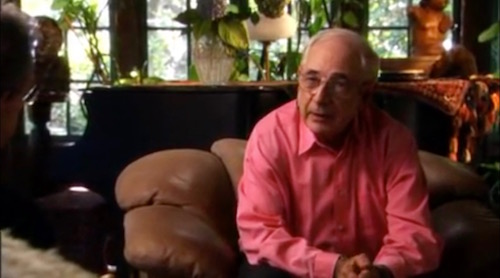 Neuroscience & Mind
Neuroscience & Mind
John Searle on Free Will
Philosopher of the mind John Searle was interviewed several years ago about free will. Searle is most famous for his convincing demolition of the concept that the mind is a kind of computation. Above, he expounds about free will, and gets a lot of things wrong. (Click on the image to watch the video.)
Searle is confused about the genuine issues in the free will debate. The viewpoint that there is no free will is abject nonsense. Besides the fact that it is a denial of all human experience, and a denial of the universally accepted consensus (even accepted by free will deniers) about human accountability that makes life in society possible, the denial of free will is wrong for three independent and irrefutable reasons: for empirical reasons, for reason of self-refutation, and for metaphysical reasons.
1. Empirical reason
Searle (and most free will deniers) argue that physical determinism makes free will indefensible.
But physical determinism is false. Physicists are in agreement that physics is not deterministic, at least in the sense that there are no local hidden variables. The question of determinism in physics was raised by Einstein in his famous EPR paper in the 1930s, in which he argued that despite the apparent non-deterministic nature of quantum mechanics, there must be a determinism concealed in nature. It was not clear how this issue of determinism versus non-determinism could be decided until John Bell published in the 1960s a recommendation for an ingenious experiment that could test determinism in nature. Bell’s hypothesis was tested empirically in the 1980s by Alain Aspect and his team in France, and several iterations of the experiments have been performed since. The results are clear: there are no local hidden variables in nature, which means that nature is non-deterministic.
Deniers of free will who assert that determinism makes free will untenable are either pitifully misinformed about the current state of science, or they are deliberately ignoring it in order to persist in their erroneous metaphysical claim. That a philosopher of the rank of John Searle would make a claim that is as scientifically vacuous as the claim that nature is deterministic, decades after that claim has been refuted by physicists, is a scandal.
2. Self-refutation
Free will deniers refute their own argument. If free will is not real, and the will is wholly determined by physical causes, then the opinion that “free will does not exist” is wholly a product of physical causes. But physical causes — neurochemistry — are neither true nor false. Chemical reactions produce products, not propositions. Since there is no truth value in the product of a chemical reaction, then there can be no truth value in the statement “there is no free will” because the statement itself, if true, is wholly the product of a chemical reaction, which is not a process capable of being true or false.
When John Searle says that determinism is true, he is saying that we should pay no attention to the truth or falsehood of his opinions, because his opinions are just chemical reactions. That a philosopher of his prominence would make such an argument is breathtaking.
3. Metaphysics
The third reason that the assertion that “free will is not real” is erroneous also points us to what free will actually is.
I have pointed out many times that the human intellect and will are immaterial powers of the mind. This is so because abstract thought is the contemplation of universal concepts, such as mathematics, ethics, philosophy, logic, etc., none of which have complete instantiation in matter. The concept of “justice” isn’t a physical thing — it has no location or length or mass or volume. Therefore, it cannot be in brain tissue. Therefore it must be an immaterial thing. And the argument that there is a representation of the concept of justice in the brain, but not the concept of justice itself, is of no use. In order to represent the concept of justice, one presupposes the concept of justice. A photograph presupposes the existence of that which is represented in the photograph. A map of a city presupposes a city. Representation presupposes that which it represents. So, even if there is a “representation” of the concept of justice in the brain, you haven’t explained the concept of justice, which is that which you need to explain.
Abstract thought is immaterial, and the intellect and will, which are the powers by which we contemplate abstract thoughts, are immaterial powers of the mind. As such, the will cannot be determined by physics and chemistry, because the will is not a physical or chemical process. The will is free, in the sense that it is not determined by any physical thing. Of course the will is influenced by physical substances, such as alcohol, and the will is influenced by immaterial powers such as the intellect (a subject for discussion another time), but influence is not determination.
It is in the nature of man that his will is an immaterial power of the soul, and the will is free in the sense that it is not determined by physical processes. The denial of free will is a crude philosophical error, made not only by philosophical naïfs like Jerry Coyne, but by accomplished philosophers like John Searle.
The denial of free will speaks to the witless morass that is modern philosophy of the mind. It’s worthwhile noting that this philosophical morass isn’t unfocused. Rather, it is quite specific, with what appears to be an implicit, and on occasion explicit, purpose. Modern philosophy of mind is a focused effort to deny human exceptionalism.
Photo: John Searle via YouTube.

